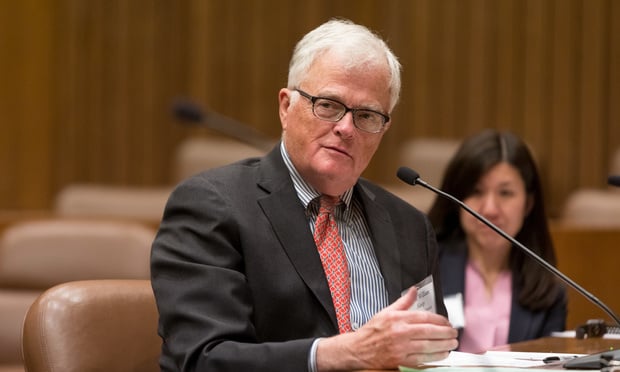Federal Circuit Backs Alsup on Confidentiality But Asks Him to Reconsider Rights of Licensees
The Federal Circuit said the judge was within his rights to refuse a broad sealing request from Uniloc 2017 in its patent dispute with Apple. But on the most contentious issue—Uniloc's confidential licenses with third parties—the court said U.S. District Judge William Alsup would have to more carefully consider the rights of licensees.
July 09, 2020 at 08:20 PM
3 minute read
 Judge William Alsup, U.S. District Court for the Northern District of California. (Jason Doiy/The Recorder)
Judge William Alsup, U.S. District Court for the Northern District of California. (Jason Doiy/The Recorder)On the same day the U.S. Supreme Court ruled that the president can, in theory, be forced to divulge personal financial records, the U.S. Court of Appeals for the Federal Circuit forcefully backed a district judge's power to compel a patent owner to disclose private material during litigation.
A Federal Circuit panel led by Judge Haldane Mayer ruled that because Uniloc 2017 LLC's initial motion to seal confidential information in its dispute with Apple Inc. was wildly overbroad, U.S. District Judge William Alsup did not abuse his discretion when he compelled Uniloc to disclose information about its relationship with Fortress Credit Co. and more than 100 third-party licensees.
"In denying Uniloc's sweeping motion to seal, the district court sent a strong message that litigants should submit narrow, well-supported sealing requests in the first instance," Mayer wrote for a unanimous panel in Uniloc 2017 v. Apple. Chief Judge Sharon Prost and Judge Richard Taranto concurred.
But as with the Supreme Court's decisions Thursday, the devil will be in the details on remand. The Federal Circuit instructed Alsup to reconsider the most contentious issue: the redaction of confidential licenses with companies such as Microsoft. Uniloc has argued that confidential licenses and royalty rates are "the life blood of a company that relies on licensing its intellectual property."
Alsup, of the Northern District of California, had refused Uniloc's request to seal multiple pages of information covering Uniloc's governance, its financial arrangement with Fortress, and the licensing agreements. Alsup argued that the request was "astonishing" in its overbreadth, as the redactions covered entire exhibits and declarations, and such clearly nonconfidential matter as quotations from public case law. As for the licenses, Alsup reasoned that because Uniloc's patent rights flow from a government-conferred power to exclude, "the public in turn has a strong interest in knowing the full extent of the terms and conditions involved in Uniloc's exercise of its patent rights."
On remand, Alsup will need to make specific findings that can help the Federal Circuit balance the public's right of access against the third parties' rights of confidentiality, including whether any of the licenses are protectable as a trade secret and whether disclosing them could cause material injury to the third party, Mayer wrote.
Still, Uniloc will have to make public certain information about itself and its related entities. But whether Fortress will be considered a Uniloc-related entity or a third party is also up for debate. The Federal Circuit said it would leave to Alsup's sound discretion "the question of whether the interests of Fortress are so closely aligned with those of Uniloc that it should be deemed a Uniloc-related entity for purposes of determining whether its purportedly confidential materials should be sealed or redacted."
Electronic Frontier Foundation staff attorney Alex Moss argued the appeal for intervenor EFF. Prince Lobel Tye partner Aaron Jacobs argued for Uniloc. Goldman Ismail Tomaselli Brennan & Baum partner Doug Winnard argued for Apple.
This content has been archived. It is available through our partners, LexisNexis® and Bloomberg Law.
To view this content, please continue to their sites.
Not a Lexis Subscriber?
Subscribe Now
Not a Bloomberg Law Subscriber?
Subscribe Now
NOT FOR REPRINT
© 2025 ALM Global, LLC, All Rights Reserved. Request academic re-use from www.copyright.com. All other uses, submit a request to [email protected]. For more information visit Asset & Logo Licensing.
You Might Like
View All
'A Death Sentence for TikTok'?: Litigators and Experts Weigh Impact of Potential Ban on Creators and Data Privacy

‘Extremely Disturbing’: AI Firms Face Class Action by ‘Taskers’ Exposed to Traumatic Content
5 minute read

Patreon Hit With Lawsuit for Allegedly Diverting Subscriber Data to Meta
Law Firms Mentioned
Trending Stories
- 1'A Death Sentence for TikTok'?: Litigators and Experts Weigh Impact of Potential Ban on Creators and Data Privacy
- 2Bribery Case Against Former Lt. Gov. Brian Benjamin Is Dropped
- 3‘Extremely Disturbing’: AI Firms Face Class Action by ‘Taskers’ Exposed to Traumatic Content
- 4State Appeals Court Revives BraunHagey Lawsuit Alleging $4.2M Unlawful Wire to China
- 5Invoking Trump, AG Bonta Reminds Lawyers of Duties to Noncitizens in Plea Dealing
Who Got The Work
J. Brugh Lower of Gibbons has entered an appearance for industrial equipment supplier Devco Corporation in a pending trademark infringement lawsuit. The suit, accusing the defendant of selling knock-off Graco products, was filed Dec. 18 in New Jersey District Court by Rivkin Radler on behalf of Graco Inc. and Graco Minnesota. The case, assigned to U.S. District Judge Zahid N. Quraishi, is 3:24-cv-11294, Graco Inc. et al v. Devco Corporation.
Who Got The Work
Rebecca Maller-Stein and Kent A. Yalowitz of Arnold & Porter Kaye Scholer have entered their appearances for Hanaco Venture Capital and its executives, Lior Prosor and David Frankel, in a pending securities lawsuit. The action, filed on Dec. 24 in New York Southern District Court by Zell, Aron & Co. on behalf of Goldeneye Advisors, accuses the defendants of negligently and fraudulently managing the plaintiff's $1 million investment. The case, assigned to U.S. District Judge Vernon S. Broderick, is 1:24-cv-09918, Goldeneye Advisors, LLC v. Hanaco Venture Capital, Ltd. et al.
Who Got The Work
Attorneys from A&O Shearman has stepped in as defense counsel for Toronto-Dominion Bank and other defendants in a pending securities class action. The suit, filed Dec. 11 in New York Southern District Court by Bleichmar Fonti & Auld, accuses the defendants of concealing the bank's 'pervasive' deficiencies in regards to its compliance with the Bank Secrecy Act and the quality of its anti-money laundering controls. The case, assigned to U.S. District Judge Arun Subramanian, is 1:24-cv-09445, Gonzalez v. The Toronto-Dominion Bank et al.
Who Got The Work
Crown Castle International, a Pennsylvania company providing shared communications infrastructure, has turned to Luke D. Wolf of Gordon Rees Scully Mansukhani to fend off a pending breach-of-contract lawsuit. The court action, filed Nov. 25 in Michigan Eastern District Court by Hooper Hathaway PC on behalf of The Town Residences LLC, accuses Crown Castle of failing to transfer approximately $30,000 in utility payments from T-Mobile in breach of a roof-top lease and assignment agreement. The case, assigned to U.S. District Judge Susan K. Declercq, is 2:24-cv-13131, The Town Residences LLC v. T-Mobile US, Inc. et al.
Who Got The Work
Wilfred P. Coronato and Daniel M. Schwartz of McCarter & English have stepped in as defense counsel to Electrolux Home Products Inc. in a pending product liability lawsuit. The court action, filed Nov. 26 in New York Eastern District Court by Poulos Lopiccolo PC and Nagel Rice LLP on behalf of David Stern, alleges that the defendant's refrigerators’ drawers and shelving repeatedly break and fall apart within months after purchase. The case, assigned to U.S. District Judge Joan M. Azrack, is 2:24-cv-08204, Stern v. Electrolux Home Products, Inc.
Featured Firms
Law Offices of Gary Martin Hays & Associates, P.C.
(470) 294-1674
Law Offices of Mark E. Salomone
(857) 444-6468
Smith & Hassler
(713) 739-1250






